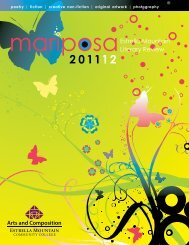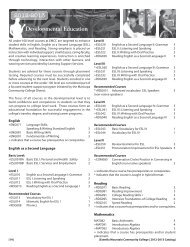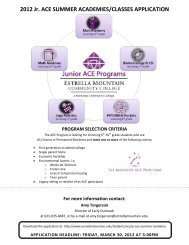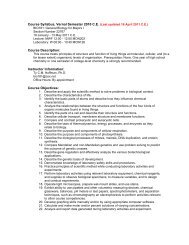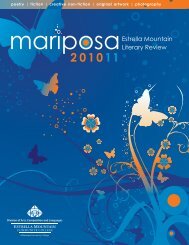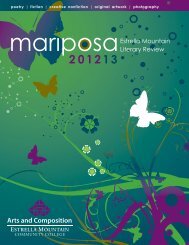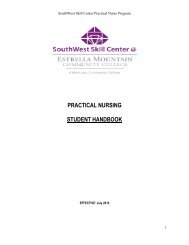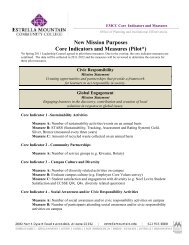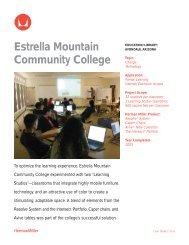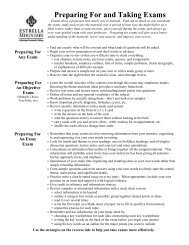MCCCD Policies and Procedures - Estrella Mountain Community ...
MCCCD Policies and Procedures - Estrella Mountain Community ...
MCCCD Policies and Procedures - Estrella Mountain Community ...
You also want an ePaper? Increase the reach of your titles
YUMPU automatically turns print PDFs into web optimized ePapers that Google loves.
<strong>MCCCD</strong> <strong>Policies</strong> <strong>and</strong> <strong>Procedures</strong><br />
iv. Experimental courses<br />
v. Post baccalaureate courses<br />
vi. Contractual training for business, industry, <strong>and</strong> government<br />
vii. Some forms of credit for prior learning<br />
viii. Non‐credit courses<br />
D. Time Limit for Transfer Coursework<br />
Students should be aware other colleges <strong>and</strong> universities may have age of credit limits on certain coursework to<br />
be used in transfer. Students should refer to the policy of their intended transfer institution regarding time limits<br />
for transfer coursework.<br />
E. Shared Unique Numbering (SUN) System Course Information<br />
Senate Bill 1186, which passed into law in 2010, m<strong>and</strong>ated the creation of a shared numbering system for public<br />
college <strong>and</strong> university courses in Arizona to identify courses that transfer from community colleges to<br />
universities toward a baccalaureate degree. The shared unique number (SUN) system is a college course<br />
numbering system designed to help students locate <strong>and</strong> enroll in courses that have direct equivalents for<br />
transfer among Arizona’s public community colleges <strong>and</strong> three state universities. However, even if a course at<br />
the Maricopa <strong>Community</strong> Colleges is not designated as a SUN course, it could still transfer to other Arizona<br />
public institutions with a direct equivalent as per the course equivalency guide on aztransfer.com. The SUN<br />
system does not address the applicability of courses. Students are encouraged to work with an academic advisor<br />
on course selections. To access a list of SUN courses, visit www.azsunsystem.com.<br />
5. Servicemen's Opportunity College<br />
The Maricopa <strong>Community</strong> Colleges recognize the unique educational problems confronting many active duty<br />
military personnel in attaining their educational goals. The colleges have, therefore, established themselves as<br />
Servicemen's Opportunity Colleges. This means that the colleges recognize the peculiar needs of military personnel<br />
in that they provide courses on the various military bases located in Maricopa County <strong>and</strong> provide opportunities to<br />
complete courses through non‐traditional means when education is interrupted by military obligations. Maricopa<br />
<strong>Community</strong> Colleges maintain liberal entrance requirements, offer maximum credit for educational experiences<br />
obtained in the Military Services, <strong>and</strong> follow residency statutes applicable to the special needs of servicemen.<br />
Maricopa <strong>Community</strong> Colleges follow the recommendations established by the American Council on Education. If,<br />
for any reason, Maricopa <strong>Community</strong> Colleges' status as a Servicemen's Opportunity College District is discontinued,<br />
it will nonetheless maintain its commitment to students previously enrolled. In addition, the option to enter into a<br />
"contract for a degree" allows the community college, as the college of record, to grant a degree upon completion of<br />
twelve (12) credit hours at the college <strong>and</strong> the satisfaction of graduation requirements.<br />
2.2.6 Academic Advising<br />
Academic advising assists students in the formation of educational plans <strong>and</strong> goals. This is an ongoing process of<br />
clarification, evaluation, re‐clarification, <strong>and</strong> re‐evaluation.<br />
1. The ultimate responsibility for making decisions about life goals <strong>and</strong> educational plans rests with the student. The<br />
academic advisor helps to identify <strong>and</strong> assess alternatives <strong>and</strong> consequences.<br />
2. The academic advisor also serves as a resource for accurate information. The advisor is knowledgeable about<br />
institutional policies, procedures, programs <strong>and</strong> resources <strong>and</strong> assists students in making use of printed <strong>and</strong> online<br />
materials.<br />
3. Advisors are in a position to help students identify their learning‐related needs. Feedback received from advisors<br />
could be beneficial <strong>and</strong> should be used in policy‐making decisions at all levels of the institutional administration.<br />
With the help of an academic advisor, students will:<br />
1. gain an underst<strong>and</strong>ing of their academic abilities <strong>and</strong> interests<br />
2. be reinforced in their successes<br />
[<strong>Estrella</strong> <strong>Mountain</strong> <strong>Community</strong> College | 2012-2013 Catalog] [248]



